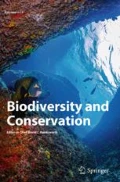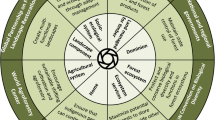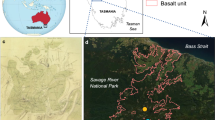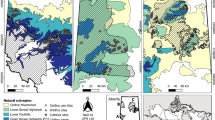Abstract
In Wisconsin, as in other states, management goals sometimes include restoration of historical forest conditions, which may prepare forests to be more compatible with future climates, disturbances such as drought and fire, and forest health threats. We quantified historical (1830–1866) composition and structure to develop historical reference conditions for restoration and documented changes based on current (2005–2009) forest surveys in Wisconsin. We provided structural metrics, functional group composition, and forest types for 186 ecological land types, and we also summarized trends in composition and structure. Wisconsin forests historically were comprised of 46% oak or pine savanna or woodland, 6% pine forest, and 48% forests primarily consisting of late-successional eastern broadleaf forest species and early-successional northern mixed forest species; densities of these forest types ranged from 60 to 460 trees/ha. In the Eastern Broadleaf Forest ecological division, increased composition of the early-successional and mid-successional eastern broadleaf forest groups (from 10 to 40%) and (planted) pine group (8–23%) occurred along with decreased fire-tolerant oak composition (from 65 to 23%). Density increased in current forests compared to historical forests by a factor of 2.2; despite increased density, basal area increased only slightly due to the presence of larger diameter trees in historical tree surveys. In the Northern Mixed Forest ecological division, increased composition of the mid-successional eastern broadleaf forest group (from 12 to 24%) and late-successional northern mixed forest group (from 10 to 17%) occurred due to decreased composition of the fire-tolerant pine group (from 17 to 9%) and late-successional eastern broadleaf forest group (from 30 to 20%). Density remained similar in current forests compared to historical forests but current basal area was 50% of historical basal area. The transition from open fire-tolerant oak and pine forests, with rarity of early-successional tree species, to closed forests composed of a variety of early- and mid-successional tree species parallels results from other research. Replacement of open oak or pine forest ecosystems by dense forests has moved Wisconsin outside of the historical range of variability, likely reducing plant and wildlife species associated with open oak and pine ecosystems.




Similar content being viewed by others
References
Allen CD, Macalady AK, Chenchouni H, Bachelet D, McDowell N, Vennetier M, Kitzberger T, Rigling A, Breshears DD, Hogg EH, Gonzalez P, Fensham R, Zhangm Z, Castro J, Demidova N, Lim J-H, Allard G, Running SW, Semerci A, Cobb N (2010) A global overview of drought and heat-induced tree mortality reveals emerging climate change risks for forests. For Ecol Manag 259:660–684
Amatangelo KL, Fulton MR, Rogers DA, Waller DM (2011) Converging forest community composition along an edaphic gradient threatens landscape-level diversity. Divers Distrib 17:201–213
Arner SL, Woundeberg S, Waters S, Vissage J, MacLean C, Thompson M, Hansen M (2003) National algorithms for determining stocking class, stand size class, and forest type for Forest Inventory and Analysis plots. http://www.fs.fed.us/fmsc/ftp/fvs/docs/gtr/Arner2001.pdf. Accessed Mar 2015
Bechtold WA, Patterson PL (2005) The enhanced forest inventory and analysis program-national sampling design and estimation procedures. Gen. Tech. Rep. SRS-80. U.S. Department of Agriculture, Forest Service, Southern Research Station, Asheville, NC
Bolliger J, Schulte LA, Burrows SN, Sickley TA, Mladenoff DJ (2004) Assessing ecological restoration potentials of Wisconsin (U.S.A.) using historical landscape reconstructions. Restor Ecol 12:124–142
Bouldin J (2008) Some problems and solutions in density estimation from bearing tree data: a review and synthesis. J Biogeogr 35:2000–2011
Bourdo EA (1956) A review of the General Land Office survey and of its use in quantitative studies of former forests. Ecology 37:754–768
Brandt L, He H, Iverson L, Thompson III FR, Butler P, Handler S, Janowiak M, et al (2014) Central Hardwoods ecosystem vulnerability assessment and synthesis: a report from the Central Hardwoods Climate Change Response Framework project. USDA For. Serv., Gen. Tech. Rep. NRS-124, Northern Research Station, Newtown Square, PA
Canham CD, Loucks OL (1984) Catastrophic windthrow in the presettlement forests of Wisconsin. Ecology 65(3):803–809
Cogbill CV, Thurman AL, Williams JW, Zhu J, Mladenoff DJ, Goring SJ (2018) A retrospective on the accuracy and precision of plotless forest density estimators in ecological studies. Ecosphere 9(4):e02187
Cottam G, Curtis JT (1956) The use of distance measures in phytosociological sampling. Ecology 37:451–460
Ecomap (2007) National hierarchical framework of ecological units. USDA Forest Service, Washington, DC, USA
Fahey RT, Lorimer CG, Mladenoff DJ (2012) Habitat heterogeneity and life-history traits influence presettlement distributions of early-successional tree species in a late-successional, hemlock-hardwood landscape. Landsc Ecol 27:999–1013
Foltz MJ, Perez KE, Volk TJ (2013) Molecular phylogeny and morphology reveal three new species of Cantharellus within 20 m of one another in western Wisconsin, USA. Mycologia 105:447–461
Frelich LE, Lorimer CG (1991) Natural disturbance regimes in hemlock-hardwood forests of the Upper Great Lakes Region. Ecol Monogr 61(2):145–164
Goring SJ, Mladenoff DJ, Cogbill CV, Record S, Paciorek CJ, Jackson ST, Dietze MC, Dawson A, Matthes JH, McLachlan JS, Williams JW (2016) Novel and lost forests in the upper Midwestern United States, from new estimates of settlement-era composition, stem density, and biomass. PLoS ONE 11(12):e0151935
Guyette RP, Thompson FR, Whittier J, Stambaugh MC, Dey DC (2014) Future fire probability modeling with climate change data and physical chemistry. Forest Sci 60(5):862–870
Hanberry BB (2019) Trajectory from beech and oak forests to eastern broadleaf forests in Indiana. Ecol Process 8:3
Hanberry BB, Abrams MD (2018) Recognizing loss of open forest ecosystems by tree densification and land use intensification in the Midwestern USA. Reg Environ Chang 18:1731–1740
Hanberry BB, Thompson FR III (2019) Open forest management for early successional birds. Wildl Soc Bull 43:141–151
Hanberry BB, Fraver S, He HS, Yang J, Dey DC, Palik BJ (2011) Spatial pattern corrections and sample sizes for forest density estimates of historical tree surveys. Landsc Ecol 26:59–68
Hanberry BB, Palik BJ, He HS (2012a) Comparison of historical and current forest surveys for detection of homogenization and mesophication of Minnesota forests. Landsc Ecol 27:1495–1512
Hanberry BB, Yang J, Kabrick JM, He HS (2012b) Adjusting forest density estimates for surveyor bias in historical tree surveys. Am Midl Nat 167:285–306
Hanberry BB, Kabrick JM, He HS (2014a) Densification and state transition across the Missouri Ozarks landscape. Ecosystems 17:66–81
Hanberry BB, Jones-Farrand DT, Kabrick JM (2014b) Historical open forest ecosystems in the Missouri Ozarks: reconstruction and restoration targets. Ecol Restor 32:407–416
Hanberry BB, Noss RF, Safford HD, Allison SK, Dey DC (2015) Restoration is preparation for the future. J Forest 113:425–429
Hanberry BB, Bragg DC, Hutchinson TF (2018) A reconceptualization of open oak and pine ecosystems of eastern North America using a forest structure spectrum. Ecosphere 9(10):e02431
He HS, Mladenoff DJ, Sickley TA, Guntenspergen GG (2000) GIS interpolations of witness tree records (1839-1866) for northern Wisconsin at multiple scales. J Biogeogr 27:1031–1042
Hunter ML Jr, Schmiegelow FKA (2011) Wildlife, forests and forestry, 2nd edn. Prentice Hall, New York, p 259
IPCC (2014) Climate Change 2014: synthesis report. In: Core Writing Team, Pachauri RK, Meyer LA (eds) Contribution of working groups I, II and III to the fifth assessment report of the intergovernmental panel on climate change, IPCC, Geneva, Switzerland, p 151
Iverson LR, Prasad AM, Matthews SN, Peters M (2008) Estimating potential habitat for 134 eastern US tree species under six climate scenarios. For Ecol Manag 254:390–406
Johnson PS, Shifley SR, Rogers R, Dey DC, Kabrick JM (2019) The ecology and silviculture of oaks, 3rd edn. CABI Publishing, New York
Johnstone JF, Chapin FS (2006) Fire interval effects on successional trajectory in boreal forests of northwest Canada. Ecosystems 9:268–277
Johnstone JF, Hollingsworth TN, Chapin FS, Mack MC (2010) Changes in fire regime break the legacy lock on successional trajectories in Alaskan boreal forest. Glob Change Biol 16:1281–1295
Kinkead CS, Stambaugh MC, Kabrick JM (2017) Mortality, scarring, and growth in an oak woodland following prescribed fire and commercial thinning in the Ozark Highlands. For Ecol Manag 403:12–26
Kronenfeld BJ, Wang Y-C (2007) Accounting for surveyor inconsistency and bias in estimation of tree density from presettlement land survey records. Can J For Res 37:2365–2379
Landres PB, Morgan P, Swanson FJ (1999) Overview of the use of natural variability concepts in managing ecological systems. Ecol Appl 9:1179–1188
Leach MK, Givnish TJ (1999) Gradients in the composition, structure, and diversity of remnant oak savannas in southern Wisconsin. Ecol Mongr 69:353–374
Liu F, Mladenoff DJ, Keuler NS, Moore LS (2011) Broadscale variability in tree data of the historical Public Land Survey and its consequences for ecological studies. Ecol Monogr 81(2):259–275
Lorimer CG, White AS (2003) Scale and frequency of natural disturbances in the northeastern US: implications for early successional forest habitats and regional age distributions. For Ecol Manag 185:41–64
McKenney DW, Pedlar JH, Lawrence K, Campbell K, Hutchinson MF (2007) Potential impacts of climate change on the distribution of North American trees. Bioscience 57(11):939–948
Millar CI, Woolfenden WB (1999) The role of climate change in interpreting historical variability. Ecol Appl 9:1201–1216
Mitchell RJ, Duncan SL (2009) Range of variability in southern Coastal Plain forests: its historical, contemporary, and future role in sustaining biodiversity. Ecol Soc 14:17
Moore MM, Covington WW, Fulé PZ (1999) Reference conditions and ecological restoration: a southwestern ponderosa pine perspective. Ecol Appl 9:1266–1277
Morisita M (1957) A new method for the estimation of density by the spacing method, applicable to non-randomly distributed populations. Seiri Seitai 7:134–144 (in Japanese)
Niinemets Ü, Valladares F (2006) Tolerance to shade, drought, and waterlogging of temperate northern hemisphere trees and shrubs. Ecol Monogr 76:521–547
Nowacki GJ, Abrams MD (2008) The demise of fire and “mesophication” of forests in the eastern United States. Bioscience 58(2):123–138
Peterson DW, Reich PB (2008) Fire frequency and tree canopy structure influence plant species diversity in a forest-grassland ecotone. Plant Ecol 194:5–16
Pollard JH (1971) On distance estimators of density in randomly distributed forests. Biometrics 27:991–1002
Pyne SJ (1982) Fire in America. Princeton University Press, Princeton, NJ, p 654
Radeloff VC, Mladenoff DJ, He HS, Boyce MS (1999) Forest landscape change in the northwestern Wisconsin pine barrens from pre-European settlement to the present. Can J For Res 29:1649–1659
Ratajczak Z, Nippert JB, Collins SL (2012) Woody encroachment decreases diversity across North American grasslands and savannas. Ecology 93(4):697–703
Rhemtulla JM, Mladenoff DJ, Clayton MK (2007) Regional land-cover conversion in the US upper Midwest: magnitude of change and limited recovery (1850-1935-1993). Landsc Ecol 22:57–75
Rhemtulla JM, Mladenoff DJ, Clayton MK (2009) Legacies of historical land use on regional forest composition and structure in Wisconsin, USA (mid-1800s-1930s-2000 s). Ecol Appl 19(4):1061–1078
Rogers DA, Rooney TP, Olson D, Waller DM (2008) Shifts in southern Wisconsin forest canopy and understory richness, composition, and heterogeneity. Ecology 89:2482–2492
Rogers DA, Rooney TP, Hawbaker TJ, Radeloff VC, Waller DM (2009) Paying the extinction debt in southern Wisconsin forest understories. Conserv Biol 23:1497–1506
Rooney TP, Wiegmann SM, Rogers DA, Waller DM (2004) Biotic impoverishment and homogenization in unfragmented forest understory communities. Conserv Biol 18:787–798
Schulte LA, Mladenoff DJ (2005) Severe wind and fire regimes in northern forests: historical variability at the regional scale. Ecology 86:431–445
Schulte LA, Mladenoff DJ, Nordheim EV (2002) Quantitative classification of a historic northern Wisconsin (U.S.A) landscape: mapping forests at regional scales. Can J For Res 32:1616–1638
Schulte LA, Mladenoff DJ, Crow TR, Merrick LC, Cleland DT (2007) Homogenization of northern U.S. Great Lakes forests due to land use. Landsc Ecol 22:1089–1103
Sickley TA, Mladenoff DJ, Manies KL (2001) Pre-European settlement vegetation of Wisconsin database. Forest Landscape Ecology Lab. https://data-widnr.opendata.arcgis.com/datasets/33ce2a00886c48ffad7aeba0b3232971_0/data. Accessed 13 June 2019
Thompson JR, Duncan SL, Johnson KN (2009) Is there potential for the historical range of variability to guide conservation given the social range of variability? Ecol Soc 14:18
Thompson JR, Carpenter DN, Cogbill CV, Foster DR (2013) Four centuries of change in northeastern United States forests. PLoS ONE 8:e72540
Tilman D, May RM, Lehman CL, Nowak MA (1994) Habitat destruction and the extinction debt. Nature 371:65–66
Vander Yacht AL, Barrioz SA, Keyser PD, Harper CA, Buckley DS, Buehler DA, Applegate RD (2017) Vegetation response to canopy disturbance and season on burn during oak woodland and savanna restoration in Tennessee. For Ecol Manag 390:187–202
Waldrop TA, Yaussy DA, Phillips RJ, Hutchinson TF, Brudnak L, Boerner REJ (2008) Fuel reduction treatments affect stand structure of hardwood forests in western North Carolina and southern Ohio, USA. For Ecol Manag 255:3117–3129
White CA (1983) A history of the rectangular survey system. Bureau of Land Management, Government Printing Office, Washington DC, USA
Whitney GG (1994) From coastal wilderness to fruited plain. Cambridge University Press, Cambridge, p 451
Whitney GG, Decant JP (2003) Physical and historical determinants of the pre- and post-settlement forests of northwestern Pennsylvania. Can J For Res 33:1683–1697
Williams M (1989) Americans and their forests a historical geography. Cambridge University Press, Cambridge, p 599
Zenner EK, Kabrick JM, Jensen RG, Peck JE, Grabner JK (2006) Responses of ground flora to a gradient of harvest intensity in the Missouri Ozarks. For Ecol Manag 222:326–334
Acknowledgements
We thank B. Sturtevant and D. DonnerWright for their reviews.
Author information
Authors and Affiliations
Corresponding author
Additional information
Communicated by Daniel Sanchez Mata.
Publisher's Note
Springer Nature remains neutral with regard to jurisdictional claims in published maps and institutional affiliations.
This article belongs to the Topical Collection: Forest and plantation biodiversity.
Electronic supplementary material
Below is the link to the electronic supplementary material.
Rights and permissions
About this article
Cite this article
Hanberry, B.B., Dey, D.C. Historical range of variability for restoration and management in Wisconsin. Biodivers Conserv 28, 2931–2950 (2019). https://doi.org/10.1007/s10531-019-01806-8
Received:
Revised:
Accepted:
Published:
Issue Date:
DOI: https://doi.org/10.1007/s10531-019-01806-8




